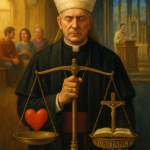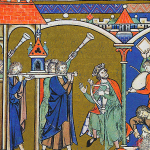You may remember this practice stirred some criticism a couple weeks ago. Now, authorities are investigating:
A decade after the Air Force Academy football team invited controversy and censure over an “I am a member of Team Jesus” banner in its locker room, the Falcons again appear to be striking a decidedly Christian pose, its members dropping to one knee and holding hands in a public pre-game prayer circle.
The academy issued a statement saying it is investigating the practice after cadets and faculty brought it to the attention of the Military Religious Freedom Foundation, a watchdog group.
“The United States Air Force Academy is attentive to all religious freedom concerns, and we are conducting an inquiry into the complaint,” a statement from the school said. “The Air Force is dedicated to maintaining an environment in which people can realize their highest potential, regardless of personal religious or other beliefs.”
The academy did not say how long the Falcons have been offering the team prayer. One photo on a Defense Department website shows the team at prayer before the start of the second half of a 2013 game.
Mikey Weinstein, president and founder of the Military Religious Freedom Foundation, said the Falcons’ public prayer ritual falls afoul of the establishment clause by creating the appearance that the academy shows a preference for a particular organized religion.
Cadets and faculty who have contacted him said some players take part in the prayer circle to avoid conflict with other teammates or out of fear of retaliation.
A decade ago, the academy came under fire over a banner hanging in the team’s locker room that read “I am a Christian first and last … I am a member of Team Jesus Christ.”
That and other incidents, including a senior official creating a “J for Jesus” hand signal to give cadets — who in return would reply by calling “Rocks!” — prompted an investigation by the Air Force into religious proselytizing or intolerance at the academy.
The final report listed numerous complaints indicating a pro-Christian bias, but concluded the “problem is not overt religious discrimination, but a failure to fully accommodate all members’ needs and a lack of awareness over where the line is drawn between permissible and impermissible expression of beliefs.”
Photo: DoD











